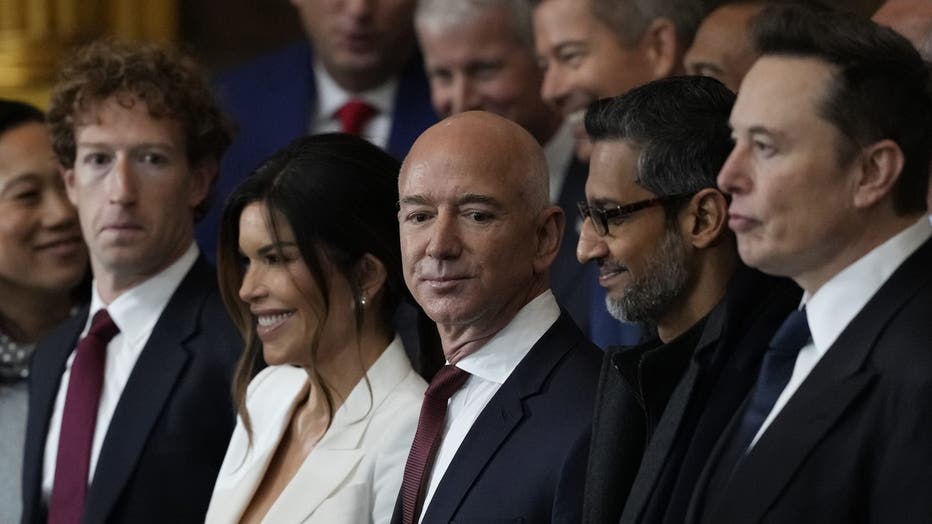World's richest 1% raised their wealth by $33.9 trillion in 10 years

Bill Gates pledges to give away most of his wealth
Microsoft billionaire Bill Gates announced Thursday that he plans to give $200 billion to his charitable foundation by 2045. Gates also called out Elon Musk, accusing him of "killing the world's poorest children" through cuts to the U.S. foreign aid budget.
The richest 1% of people on Earth own a staggering 43% of global assets, and their wealth has grown by nearly $34 trillion in the past decade.
Oxfam International, an organization that works to end poverty and inequality worldwide, released its lengthy analysis, "From Private Profit to Public Power: Financing Development, Not Oligarchy," ahead of the June 30 International Conference on Financing for Development, hosted by Spain and joined by more than 190 countries.
The paper reveals just how much global wealth has decreased, while private wealth has exponentially increased – and what this means for the 3.7 billion people living in poverty.
Global development derailed by ‘extreme inequality’
By the numbers:
According to Oxfam, the richest people on Earth increased their wealth by $33.9 trillion since 2015. The wealth of just 3,000 billionaires accounts for 14.6% of the global GDP, and the richest 1% own 43% of global assets.
Analysts say between 1995 and 2023, global private wealth grew by $342 trillion – 8 times more than global public wealth, which grew by just $44 trillion. Global public wealth – as a share of total wealth – decreased between 1995 and 2023.

Guests including Mark Zuckerberg, Lauren Sanchez, Jeff Bezos, Sundar Pichai and Elon Musk attend the Inauguration of Donald J. Trump in the U.S. Capitol Rotunda on January 20, 2025 in Washington, DC. (Photo by Julia Demaree Nikhinson - Pool/Getty Ima
It’s not just wealthy people giving less: Analysts say wealthy governments have cut more life-saving development aid in the last decade than they have since records began in 1960.
The G7 countries with the world’s largest economies – Canada, France, Germany, Italy, Japan, the United Kingdom and the U.S. – account for about 75% three-quarters of all international aid. Those seven countries are cutting aid by 28% in 2026 compared to 2024.
RELATED: Here's the salary you need to be 'financially secure' in 2025
While wealthy countries slash aid funding, Oxfam says poorer countries are in a debt crisis, with 60% of them spending more on creditors than they are on critical services.
World’s richest people
According to Forbes, nine out of the 10 richest people on Earth are from the United States. The 10 richest people are:
- Elon Musk
- Larry Ellison
- Mark Zuckerberg
- Jeff Bezos
- Warren Buffett
- Larry Page
- Steve Ballmer
- Sergey Brin
- Jensen Huang
- Bernard Arnault and family (France)
Global goals
The backstory:
Oxfam says in 2015, countries around the world agreed to a set of sustainable development goals and a plan to finance them. Called the Addis Ababa Action Agenda, Oxfam says the goals are failing: Only 16% of the targets are on track for 2030.
What they're saying:
"There is glaring evidence that global development is desperately failing because – as the last decade shows – the interests of a very wealthy few are put over those of everyone else," Amitabh Behar, Executive Director of Oxfam International, said in a news release.
"Rich countries have put Wall Street in the driver's seat of global development. It’s a global private finance takeover which has overrun the evidence-backed ways to tackle poverty through public investments and fair taxation. It is no wonder governments are abysmally off track, be it on fostering decent jobs, gender equality, or ending hunger. This wealth concentration is choking efforts to end poverty", Behar continued.
Why you should care:
More than 3.7 billion people worldwide live in poverty, "while gender injustice, hunger, and other denials of basic human rights are widespread," the report says. More than 700 million people across the world are facing hunger. Aid cuts could cause 2.9 million more children and adults to die by 2030, from HIV/AIDS causes alone, Oxfam says.
What you can do:
Oxfam wants to see governments support policies that address extreme inequality and transform the development financing system:
"Trillions of dollars exist to meet the global goals, but they’re locked away in private accounts of the ultra-wealthy. It’s time we rejected the Wall Street consensus and instead put the public in the driving seat. Governments should heed widespread demands to tax the rich – and match it with a vision to build public goods from healthcare to energy. It’s a hopeful sign that some governments are banding together to fight inequality – more should follow their lead," Behar added.
The Source: This report includes information from Oxfam International and Forbes.

